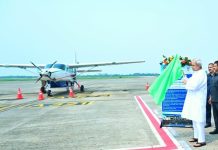The National Mission for Clean Ganga today hosted a Meet & Mingle session on ‘Integrated River Basin Management: Stakeholder Engagement’on the Second Day of Stockholm World Water Week 2021. The Program Director, WWF India, Ms. Sejal Worah as a session moderator introduced the session objective to understand the ‘real’ experiences of IRBM at International and how it can be implemented in India by elaborating the challenges and mechanisms to adopt.
Director General, National Mission for Clean Ganga, Mr. Rajiv Ranjan Mishra gave his insights on NMCG’s approach and vision of IRBM. He talked about the importance of River Ganga being the largest river basin in India and have recognition of being an international basin. The large section of the Indian population is living in the River Ganga Basin and directly connects with human life in various ways. He said that the different challenges experienced in the river basin are multi-faceted as it covers issues related to ecology, environment, economy, food security and so on.
The Director General briefed about the efforts made by NMCG of developing Ganga River Basin Management Plan by consortium with IITs. The plan covers the issue of pollution and suggested solutions with focus on retaining the water quality and quantity. The other challenges related to Environmental flow, wetland conservation and development, wildlife protection and so on are key elements covered under the GRBMP and are being implemented by NMCG in a sustainable manner by involvement on Public-Private Partnerships.
In his concluding remarks, he focused on the importance of stakeholder engagement including fisheries, agriculture, forestry, and others with aim of successful implementation of IRBM in Ganga River Basin. He said we need to learn from international experiences and understand the characteristics and challenges. To solve this multi-faceted problem a collaborative approach is required where both federal and local need to be collaborated.
Ms. SejalWorah invited Project Manager,GIZ India, Ms. Birgit Vogel to share European River Basin Management Approach and how it can be adopted within Indian context. She explained that to address the complexity of river basin system we need holistic approach integrating different tools and governance approaches. She said that the EU Water Framework has been implemented since 2000 and around 200 River Basin Management Plans have been drafted and implemented in this region. She mentioned about the knowledge support provided by GIZ for development of Tapi River Basin Management.
The major key points to consider were explained by Ms. Birgit Vogel which include basin wide scale assessment comprising what it contains, risk management cycle as basic tool, river basin committee for monitoring purposes, focus on key issues to prioritise in the basin such as pollution, quantity and quality of water, hydrological management, sand mining and so on, need to set clear objectives, with risk management measures can be developed. She concluded with remarks on focusing on stakeholder engagement and communication with all the relevant stakeholders.
The moderator invited Director, WWF India, Mr. Suresh Babu to talk on the importance of stakeholder engagement in IRBM in Ramganga basin. He started by explaining that Ramganga is the key tributary of river Ganga and most of the water is utilized for agriculture purposes. Hence the restoring of flows was conceptualized as major intervention with stakeholder engagement in Karula region within Ramganga basin. The key take-away points mentioned by him involve integration with allied departments such as horticulture, forestry and other; collaboration with farmers and youth and conducting awareness around water solutions and impact assessment through youth and community participation. He elaborated that because of the initiative taken water was brought back into river system and funds were received from various sources such as MNREGA and Irrigation Department. He concluded by saying that focus should be on defining local solutions, integration of different departments and practical scalability are important.
Concluding the panel session, Director General, NMCG gave his insights on the governance perspective and way forward in IRBM for Ganga Basin. He expressed the need to scale up the initiative mentioned during the session at larger scale and to do that prioritising the issues and developing certain policies around is refereed as key components towards IRBM. He said that the current structure having Ganga Praharis and Ganga Mitra at village levels and state level need to be escalated at different scale and regions. He mentioned that NMCG acts as an umbrella organization involving all the components and interventions towards IRBM this should be done in a learning process.
Prof. Vinod Tare, IIT-Kanpur gave his remarks to adopt bottom-up approach by empowering the district level government bodies and start initiatives including small rivers as they contribute to Ganga River Basin Management. Prof. S. Chary Vedala from ASCI talked about looking at IRBM from the inter-generational issue as well. He suggested to expand the knowledge management within, and outside NMCG as currently different efforts and initiatives taken by NMCG are limited to a certain level and learning programs can be developed at district and other governance levels. Mr. Manu Bhatnagar from INTACH talked about developing basin wise data collection system, budget-wise approaches to support IRBM implementation and data development on small streams.
As a concluding remark, Director General, NMCG reiterated on the importance of learning IRBM as an inter-generational, geographical and governance system and to keep learning and improving the IRBM system in India. It is important to not restrict it to Ganga River and develop learnings of IRBM for other river systems in India.












